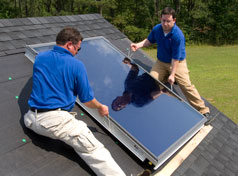Reduce Hot Water Heating Costs by as much as 80% with New Solar Water Heating System Technology
By Mark J. Donovan
|
|
Solar water heating systems are a cost effective way to help heat domestic hot water, save on home energy costs, and reduce a family’s carbon footprint. Unlike other types of solar energy technology, solar water heating is a green home building technology that is truly ready for prime time deployment in the United States, both in new home construction and existing homes.
Solar hot water heating systems have been around for decades in the United States, however the technology of the past has been less than aesthetically appealing to say the least. A typical installation consisted of large solar collector panels propped up on roofs with pipes protruding from the backs of them. Besides looking unsightly their costs and efficiency was also less than ideal. |
Today’s solar water heating systems have improved dramatically both in looks and efficiency. Companies such as the skylight manufacturer Velux, for example, are now offering solar water heating systems with solar collector panels that from the outside of the home, look just like skylights.
| How do Solar Water Heating Systems Work
At the heart of a solar hot water heating system is an array of solar collector panels. Typically the array consists of 2 to 3 panels that sit on a south facing roof. The solar collector panels contain a network of tubing that circulates a Glycol fluid through them. As the Glycol fluid heats up, it is circulated down to a hot water tank that contains a heat exchanger in it. The heat exchanger is typically constructed out of a coil of copper tubing that sits within the hot water tank itself. |
 |
As the hot Glycol fluid passes through the copper tubing coil, the tubing heats up and radiates heat outwards to the potable water surrounding the coil within the hot water tank. The water is heated up to a predetermined temperature point and is then made available to the home for use. When the hot water reaches the predetermined temperature level, circuitry also shuts down the circulation of hot Glycol fluid through the heat exchanger.
How Hot is the Fluid produced by a Solar Water Heating System
On warm summer days the Glycol fluid running through the solar collector panels can reach temperatures of around 400oF, well more than enough to heat hot water to 130-160oF, the typical temperature range of hot water found in homes.
Solar Water heating systems can operate in any climate and produce energy cost savings, as long as the solar collector panels are facing a southern exposure.
In most cases, however, a supplemental heating source is also integrated into a solar water heating system to back up the system on cloudy and rainy days.
Roof Requirements for Solar Water Heating Systems
Again, solar water heating systems need to face unobstructed southerly exposures for maximum efficiency. They can be installed on asphalt shingled, tiled, or even metal roofs. With Velux’s solar water heating system technology, the solar collector panels mount just like skylights, so they become an integral part of the roof design.
So if you have an interest in reducing your home energy costs, consider solar water heating systems. The technology has come a long way in recent years, both in terms of aesthetics and efficiency. Solar energy is clean, renewable and is non-harmful to the environment. In addition, for new home construction the payback is immediate and for existing home’s the return on investment is within a reasonable timeframe.
For help on building a home addition, see HomeAdditionPlus.com’s Home Addition Bid Sheets. Our Home Addition Bid Sheets provide you with the knowledge and information on how to plan a home addition project, and what to look for when hiring contractors. They also include detailed cost breakdown tables and spreadsheets for estimating your own new home addition building costs.
Related Information
Home Theater Systems and Books from Amazon.com
 |
 |
Free Home Addition Price Quotes with No Obligation!
Fill out our 3-5 minute quick and easy form, and receive a free price quote on a house addition from one of our prescreened and licensed home addition contractors. This process is free and there is no obligation to continue once you receive your house addition price estimate.

